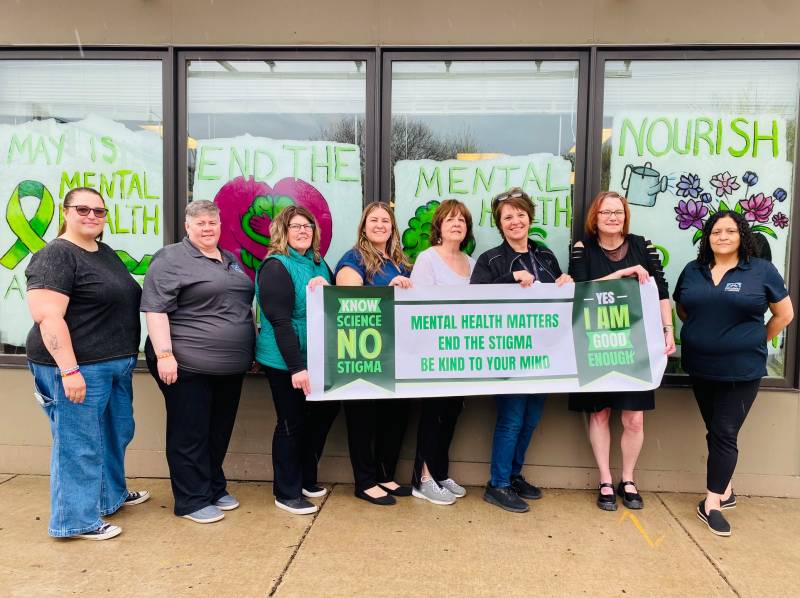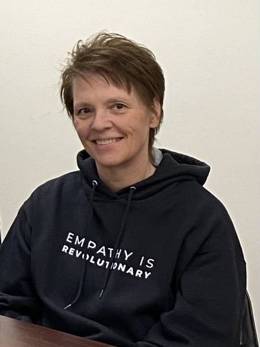Come together, share in familiar stories at mental health 'stigma-ending' event

Photo by Joanne Beck
Next time you’re out at a public event, look around and remember that 70 new people visit Genesee County’s Mental Health Department for services each year.
Given that about one in every five people has experienced some type of mental health issue in New York State, that number may seem small, though admitting a struggle with one’s mental health can still make it difficult to seek help, Mental Health Director Lynda Battaglia says.
With a range of problems to choose from nowadays — from rising prices and making a paycheck last longer to physical ailments, raising a family and a divisive political landscape — why is it important for people to stop and think about their mental health?
“It's a good question, and I think it's important for people to pay attention to and think about their mental health because it is a significant part of their overall health, right?” Battaglia said during an interview with The Batavian. “Your overall health is physical as much as it is mental; they kind of work off each other. So people need to be aware of how they feel.
"If you physically don't feel good, and you have some symptoms, and those symptoms are kind of lingering for quite some time, you would probably go to a doctor to say, ‘I’m not feeling good physically,'" she said. "With mental health, if you're having some feelings or thoughts that are depressive, or you're just kind of in a negative headspace, or you're just anxious, and you can't put your finger on why, why not go to a therapist to try to figure out why?”
May happens to be Mental Health Awareness Month, and there is an “ending the stigma event” to provide information, community resources, wellness activities, stories to inspire hope and change from people with lived experiences to show what self-care is, pizza, beverages, and a drawing for a self-care basket.
Sponsored by Genesee ACE Employment and Genesee Orleans Wyoming CARES Alliance, this event is free and includes one ticket for the basket drawing. There is a bonus ticket for those who wear green to support mental health awareness.
The event will be from 11 a.m. to 1 p.m., with Battaglia's opening remarks at noon on May 28 at First Presbyterian Church, 300 E. Main St., Batavia.
What’s the harm in shrugging off one’s feelings of sadness or anxiety, with hope that it will someday go away?
"I think people do that one because they don't know what it is. They don't recognize it, maybe as like, maybe I might need to go talk to somebody or process something," she said. "I think sometimes when people push it off, it's because they don't have time or don't want to deal with it, or they think I should be able to handle this. I feel like, if I go ask for help, I'm going to be viewed as weak when I'm a strong person, and I don't need help."
And for the person who has pretty dire thoughts and is afraid of getting locked up somewhere for speaking up about he really feels, what do you advise?
"That's a real fear, and that's what people think sometimes, the mental health system is and how it operates. But really, our goal is to keep people in the community, to keep them healthy, to wrap services around them. Sometimes people might need to have an admission for stabilization, if it's acute. But if somebody's having dire thoughts of, let's say, they're thinking about suicide, as therapists, as clinicians, we have to have those conversations," she said. "It's okay for us to have those conversations. We have to address them. We have to get to the root of why we are having these thoughts. What do you think is going on? And we can have those conversations, and it might not automatically end in admission. It might just need to be a conversation in a safe place with a person who was going to help you process the thoughts and get to the root of the thought ... millions and millions of people have those thoughts, and we have to be able to talk about it."
What's the best thing people can do if they have a loved one or a friend they're concerned about? How can they help, and can they get advice during this event?
Battaglia suggested the following things to consider and/or ask the person to try:
- They can certainly talk to their friend or their loved one, saying, ‘I’m expressing concerns, I'm worried about you. Can I take you to the mental health clinic where they have open access, where you can just walk in and see somebody?”
- Call 988, the suicide and crisis lifeline, and maybe talk it out a little bit.
- Go to an event like the one that the CARES Alliance is hosting and learn more about mental health and how we can support ourselves and our loved ones.
- “So people can go to this event, learn about it and see with their own eyes that they are not alone. That one in five New Yorkers has experienced some type of mental illness,” she said. “So you are not alone, that anxiety that you're feeling, that depression that you're going through, other people go through that, right, but that stigma kind of forbids us to reaching out and saying, I think I might need some help.”
- If those same people were experiencing a physical issue, there would likely be no doubt about suggesting a visit to the doctor or hospital for treatment, for help. But for some reason, it doesn’t come as easily when it’s the mental aspects of a person, she said, and “we have a long way to go. We're making progress.”
The CARES Alliance planning committee wants to introduce service providers—including Genesee ACE Employment, which works with job seekers and employers dealing with mental health challenges—and potentially connect them with future clients seeking assistance, member Sue Gagne said. She said the stigma still in place about mental health may serve as a stumbling block for actually pursuing answers.
“I think there are a lot of resources, people just don’t know about them,” she said. “And then the second part to that stigma is they don’t want to talk about them. So I think that’s maybe the goal. We all have physical health, but when we say mental health, it’s a negative.”
Members agreed that the main focus of this event is to provide an opportunity for people to be around others with similar stories so they don’t feel quite so alone. That’s how the stigma can begin to end: “by coming together as a whole.”
If it’s a nice day, the plan is to hang outside in the sunshine. And remember, there’s nothing weak about reaching out for help, committee members and Battaglia said.
“We all need help, in all parts of our lives, we all need help. So why not get some help for that, when down the road that continues to build, right? You just push it, you stuff it down, and it surfaces maybe a little stronger. You push it down more, and it's going to resurface until it is right at the top there,” Battaglia said. “And now you really need some help. So if you work through it at those moments when it's ‘I’m not feeling in a great head space, or I am just anxious or nervous, I don't even know what's going on, maybe I need to go talk to somebody,’ well, you might be a little ahead of the curve.”
To donate a basket for the drawing, drop it off at Genesee ACE Employment, 220 E. Main St., Batavia, by May 23.

